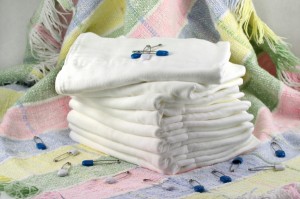Is Cloth Diapering Right For You?
When your little one arrives, it makes sense that you’ll want to have everything ready. A crib, stuffed animals, blankets, nursing bras, and many other items sit waiting for your little boy or girl’s debut. But what about diapers? Is it something you’ve really taken a moment to consider? There has long been a debate between the disposable and cloth diaper, but with technology on the side of the eco-conscious, the battle is about to be over.
Disposable Waste
More than 3 million tons of diapers go into U.S. landfills a year according to the EPA, and will take decades or even centuries to biodegrade. For many, this is enough to switch to cloth diapers, yet for those dead set against the diapers of their grandmothers, some companies have considered producing recycled diapers. It only makes sense that this would happen, because the common diaper is made of materials that can easily be recycled.
Jeffrey Potter, Director of Communications Programs for the Biodiversity Project makes mention of the advantages of recycling diapers, in that it gives us the opportunity to “treat the human waste held in the diapers, protecting our surface and groundwater supplies from potential contamination.” Yet even though 95% of diaper materials are recyclable, no such recycling centers have been created, thus the initiative goes on hold. Being the only kind of disposable diaper that would be beneficial to use, all the environmentally aware person is left with are cloth diapers.
Cloth Diaper Benefits
The cloth diapers of today have most certainly moved beyond those of your mother or grandmother’s years. An assortment of styles, types, fabrics and fastenings have brought the cloth diaper up to par with the disposable in the areas of convenience and absorption. Betty Winslow, a mother of four, used cloth diapers on all of her children with plastic pants over them. “It cut down on rashes and allergic reactions, was way cheaper since you only paid for them once…no worries about having the right size and they were easier on the environment.”
Still not convinced? Many people are reluctant to cross over to cloth because of the washing factor. It is just too easy to throw away disposable diapers, rather than deal with washing them. However, it’s really not that difficult. After depositing any solid waste into the toilet, you can wash a load of diapers in the washing machine. If you choose to, you can also presoak the diapers in a diaper pail to loosen materials and reduce the risk of staining. Once you wash the diapers, be sure to run them through a cold rinse cycle and then line dry or in the drier on a normal setting. Most diaper covers can be machine washed, unless they’re wool, which require hand washing. Regardless of washing, however, think of what sacrificing a little extra time with the laundry will benefit in other areas.
Less expense. Ask any new parent and their number one largest expense by far is diapers. If you use cloth diapers, however, you’ll save an enormous amount of money, as you only have to buy a set amount. According to Mary McCarthy, owner of Comfy Bummy Diapers, an entire set of diapers for one child should cost somewhere around $315, which includes the cost of disposable diaper liners that are completely biodegradable. How many diapers should you buy? Enough to last about 3-4 days says McCarthy, unless you want to be doing the laundry every other day.
Less hazardous. Disposable diapers fill up the landfills and don’t biodegrade fast enough to keep up with our human consumption. Cloth diapers on the other hand, are made of biodegradable materials, so when they finally have served the full extent of their purpose, they won’t add to any pollution problems.
Less leaks. Maybe not in comparison to disposable diapers, but the newer cloth diapers are much better than the old ones. No longer will you find loose fitting legs, but rather fitted diapers with maximum absorbency in the right places.
Less Irritation. Some babies can be allergic to the harsh chemicals and plastics used in making disposable diapers. A soft cotton diaper is least likely to cause rashes and cuts down on the risk of allergies. Just be sure to purchase cloth that is unbleached or chlorine-free.
Cloth Option
Many types of cloth diapers now exist and provide a wide variety of choices. From prefolds to fitted, parents can actually make a selection regarding cloth diapers. Diaper covers and wraps secure the diaper in place and prevent any leakage from occurring. You can buy diapers that have the diaper and cover connected in one piece, or you can add “doublers” or extra strips of thick cotton to add absorbency.
Tereson Thomas, inventor of the Fuzzi Bunz diaper supports the use of cloth diapers. “Today’s reusable diapers are just as convenient and easy to use as disposables are, using fasteners such as Velcro and snaps to replace pins, and new high tech fabrics to eliminate all of the hassles of ‘old time’ ways of diapering,” comments Thomas. Her patented “pocket diapers” contain polar fleece and micro-terry, that absorb better than chemical fillers and jell materials. Thomas even claims “pocket diapers” keep babies drier and can virtually eliminate diaper rash.
Cloth diapers are now healthy contenders to the highly marketed and wasteful disposable diaper. Whether or not you choose cloth for your baby is up to you, but with soft cotton covering your baby’s bottom, the benefits outweigh the “burden” of throwing them in the washing machine. To be environmentally sound, cloth is the only way to go.
Sources
Potter, Jeffrey. E-mail Interview. 25 Jan. 2005.
Thomas, Tereson. E-mail Interview. 1 Feb. 2005.
Winslow, Betty. Forum Interview. 29 Jan. 2005.


